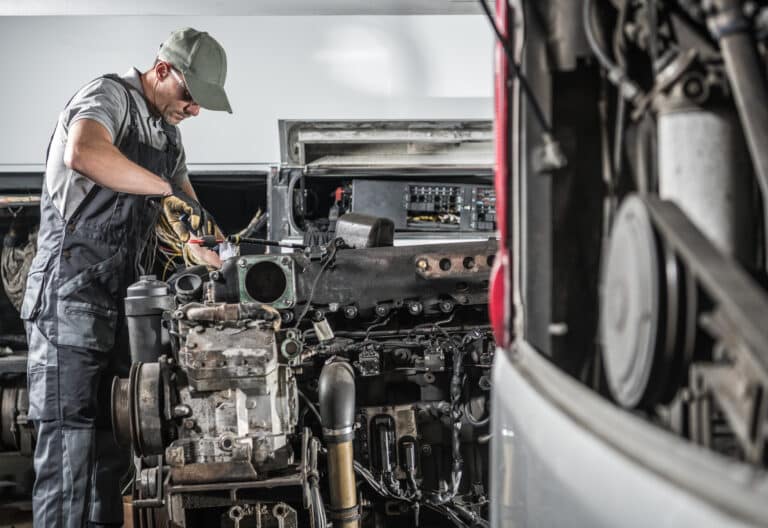A career in Diesel mechanics has been on the rise recently, and the U.S. Bureau of Labor Statistics has also reported an increase in job growth for Diesel Mechanics by 4% in the coming years.
What is Diesel Mechanic, and what do they do?
A Diesel Mechanic is a technician that inspects and repairs automobiles running on diesel engines. Their duties range from changing oils to inspecting and repairing major faults in the engines.
If you’re interested in pursuing a career in this field, you might be confused about where exactly a Diesel mechanic can work. In the article, you’ll get all the information about where you can find work as a Diesel Mechanic.

Types Of Diesel Mechanic Jobs
Diesel technicians are considered to be the backbone of transportation and energy industries since they help maintain all automobiles.
If you’re starting in this field, as in any other field, you can expect a lower starting salary. However, as you grow and gain experience over time, you can evolve your career further.
The different types of industries where you can find Diesel Mechanics are:
Trucking & Transportation
Trucking and transportation systems are among the most popular industries that demand diesel technicians. This is mainly because these heavy-loading transports carry goods in bulk, and thus, they demand maintenance more frequently as compared to other transport systems. (Read More: Heavy-Duty Diesel Mechanic)
Majorly, the diesel mechanics in this industry are employed by trucking companies and transportation authorities. The technicians are generally focused on the maintenance and repair of trucks, semi-trucks, buses, and other vehicles that are used during goods transportation.
State & Local Governments
State, as well as local governments, also offer opportunities for diesel mechanics. Many diesel technicians are known to start their careers working with local and state governments, wherein they are assigned tasks such as road crew support, maintenance for forestry equipment, and repairing city machinery and vehicles.
Diesel Automotive Maintenance and Repair
Diesel mechanics working within the diesel automotive repair industries help maintain and repair diesel-powered automobiles. These technicians usually work in maintenance shops.
Mobile Diesel Mechanics
These are technicians on the go. Often it’s impossible to get the vehicle to a repair shop, and that’s when a mobile diesel mechanic comes into the picture. They bring the shop to the customer and come with their equipment to fix any vehicle on the spot.
Power Generation Technicians
Power generation technicians help with the inspection, maintenance, and repair as well as modification of diesel generators, combustion engines, and other gaseous engines. Their main duties usually involve identifying and repairing gas and diesel generators, helping customers with cost estimates and materials, finding the cause of engine breakdowns using special tools and equipment, and maintaining files and records.
Many more industries employ diesel mechanics; however, the above-mentioned industries are more common.
Now, let’s take a look at where these technicians work.

Where Do Diesel Mechanics Work?
Even though you can find diesel mechanics in a wide range of industries, as seen earlier, there are a few common places of work for them. Some such places are:
- Truck Stops & Depots:
One of the most common places where diesel mechanics work are truck stops and depots, wherein they have to help in servicing commercial vehicles regularly.
Diesel mechanics are considered to be a vital part of the smooth running of the transport industry since the repairing and maintenance of such vehicles help truck drivers maintain their delivery schedules.
- Diesel Repair Shops:
Diesel technicians working in repair shops are required to perform maintenance and repair of diesel engines and machines.
- Field Services:
Mobile diesel technicians provide services on the go to customers and help them with repairs and maintenance at their doorstep.
- Railroads:
Diesel mechanics specialized in locomotive engines and their respective repairs and maintenance usually work on railroads. It is also expected for them to travel to different railway junctions to ensure the engine and vehicle are functioning smoothly.
- Farms Or Farm Equipment Dealer Stores:
Diesel mechanics that work on different types of farm equipment are also known as agricultural mechanics, and they usually work on tractors, tillers, or planters in all sorts of dealerships.
- Self-Employed
Many diesel mechanics end up owning their garages and helping their client base in repairing and maintaining their automobiles.
Diesel Mechanics: An Outlook
As mentioned earlier, a career in Diesel mechanics has been on a constant rise, and the demand for diesel technicians has been increasing simultaneously. According to a report by the U.S. Bureau of Labor Statistics (BLS), diesel mechanics are expected to have about 4% of job growth by the year 2031.
If you’re looking to enter this rewarding industry, you might be wondering how much you can earn as a diesel mechanic. As per the BLS, a diesel mechanic’s average national annual salary is $48,690 or $23.41 per hour. Do note that a diesel technician salary highly depends on a lot of influencing factors, such as job location, experience, and demand.
How To Earn More as a Diesel Mechanic?
Even if you’re starting your career in the field of Diesel mechanics, you might be wondering how you can bag a higher salary. Many diesel mechanics are paid more than others simply because of certain skills & choices.
If you also want to become a diesel mechanic that earns a higher-than-average salary, here is how:
- Get Trained Faster, With Online Programs
A major step in becoming a diesel mechanic is to enroll yourself in diesel mechanic training. Even though there are many options available such as getting an associate’s degree from a university or a vocational degree from a community college, choosing an online training program is highly recommended.
Opting for an accredited online program has many advantages. You will be able to complete your training much faster, you will have the option of learning at your own pace and schedule, and these programs cost much less than degrees or diplomas.
Related: How Long is Diesel Mechanic School
- Look For Externships
Few diesel mechanic schools offer externships when you complete the course. Looking for externships is important once you finish your training as this helps you get an inside perspective of a diesel mechanic’s day-to-day tasks. Externships further help you gain hands-on experience, and you get the practice of working with diesel mechanic tools.
- Get Additional Certifications
For diesel mechanics, it is required that you get your CDL. The CDL, or a Commercial Driver’s License, is a legal license needed to operate heavy machinery.

Employers prefer the ASE or Automotive Service Excellence Diesel Mechanic Certifications. You can gain multiple certifications to exhibit your advanced skillset, but if you’re just starting out, you can go for the G.1 certification.
- Work On your Soft Skills
As a diesel mechanic, you will also need to interact with customers regularly. Hence, developing some soft skills such as communication skills and patience will assist you in having a better rapport with the customers as well as your manager.
- Prepare For your Interview
Prepping for interviews is the most nerve-wracking part of applying for jobs in any profession. Even if you have all the relevant skills and knowledge to qualify as a valuable diesel mechanic, you will need to brush up on your interview skills to bag that job.
Read More: How to become a diesel mechanic
Diesel Mechanic Resume
Conclusion
As mentioned earlier, a career in diesel mechanics is slowly becoming one of the most demanded ones across the country.
If you wish to enter this industry, you should learn more about what they do and where they typically work.
The most common industries and workplaces for diesel mechanics were discussed in this article, which can help you decide if you envision yourself in this role.





